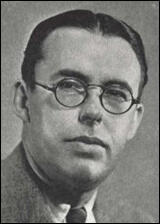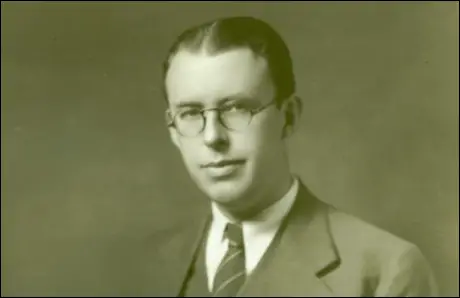Carey McWilliams

Carey McWilliams was born in Steamboat Springs, Colorado, on 13th December, 1905. The family moved to California in 1922 and McWilliams attended the University of Southern California, from which he obtained a law degree in 1927.
McWilliams practiced law in Los Angeles and developed a reputation for taking up the cases of the underprivileged. He also became friends with the writer, Upton Sinclair, and helped him in his various political campaigns. Another contact during this period was H.L. Mencken who published some of his early journalism. In 1929 McWilliams published a biography of Ambrose Bierce. McWilliams, who considered himself a socialist, was a member of numerous left-wing political and legal organizations, including the American Civil Liberties Union and the National Lawyers Guild. He was also involved in the campaign to free Tom Mooney, a trade union leader who had been convicted of a bombing which occurred in San Francisco in 1916.
McWilliams continued to work in journalism and had several articles published in The Nation. He also served as a trial examiner for the National Labor Relations Board. His book on migrant farm workers, Factories in the Field: The Story of Migratory Farm Labor in California, was published in 1939. A supporter of Culbert Olson, McWilliams agreed to become head California's Division of Immigration and Housing that year. Over the next few years he attempted to improve agricultural working conditions and wages. As governor Olson tried to introduce an advanced New Deal in California. In Olson's words that would provide "economic security from the cradle to the grave, under a government that recognizes the right to an education, to employment on a basis of just reward, and to retirement at old age in comfort and decency, as inalienable as the right to life itself."
Olson's policies were attacked by his Republican Party opponent, Earl Warren. During the 1942 governor election campaign, Warren promised audiences that his first official act would be to fire McWilliams. As soon as Warren was elected in 1942, McWilliams resigned his post. He now concentrated on journalism and wrote several books including Prejudice: Japanese-Americans (1944), A Mask for Privilege: Anti-Semitism in America (1948) and North from Mexico: The Spanish-Speaking People of the US (1949).

McWilliams was considered to be a dangerous radical and was called before the Un-American Activities Committee and FBI director J. Edgar Hoover placed him on the Custodial Detention List, making him a candidate for detention in case of national emergency. An early opponent of McCarthyism in 1950 he published Witch Hunt: The Revival of Heresy. He also helped in the legal defence of John Howard Lawson and Dalton Trumbo, two of the Hollywood Ten.
In 1951 McWilliams moved to New York City to work at The Nation under then editor Freda Kirchwey. He became editor of the magazine in 1955. He instituted investigative reports on domestic issues. This included a series on Jim Crow Laws and articles on consumer issues by Ralph Nader. In November 1960 McWilliams was the first American reporter to reveal that the CIA was training a group of Cuban exiles in Guatemala for the Bay of Pigs Invasion.
McWilliams upset a large number of people on the left with his views on the assassination of John F. Kennedy. One of those was his friend Mark Lane who tried to find a magazine to publish his article of the assassination. “The obvious choice, I thought, was the Nation. Its editor, Carey McWilliams, was an acquaintance. He had often asked me to write a piece for him… McWilliams seemed pleased to hear from me and delighted when I told him I had written something I wished to give to the Nation. When he learned of the subject matter, however, his manner approached panic.” McWilliams told Lane: “We cannot take it. We don’t want it. I am sorry but we have decided not to touch that subject.”
McWilliams also gave his support to the Warren Commission Report. It has been suggested that the critics of the lone-gunman theory were particularly hurt by his support. In a debate that took place at Beverly Hills High School on 4th December, 1964, Abraham L. Wirin, chief counsel for the American Civil Liberties Union in California and a man who had been closely associated in the past with the American Communist Party, told the audience that he tried to make up his own mind on important issues, but in the case of the Warren Commission he relied on the opinions of people who he could trust: "I consider Carey McWilliams and The Nation , as an individual and a newspaper, respectively, whose judgment I respect. I do not consider Carey McWilliams or The Nation, a person or a newspaper, which would participate in a fraud, or would condone it." Wirin pointed out The Nation had carried an article in support of the Warren Report and added: "now, that carries a lot of weight with me."
Carey McWilliams died on 27th June, 1980.
Primary Sources
(1) Mark Lane, Plausible Denial (1991)
The obvious choice, I thought, was the Nation. Its editor, Carey McWilliams, was an acquaintance. He had often asked me to write a piece for him… McWilliams seemed pleased to hear from me and delighted when I told him I had written something I wished to give to the Nation. When he learned of the subject matter, however, his manner approached panic. McWilliams told Lane: “We cannot take it. We don’t want it. I am sorry but we have decided not to touch that subject.”

